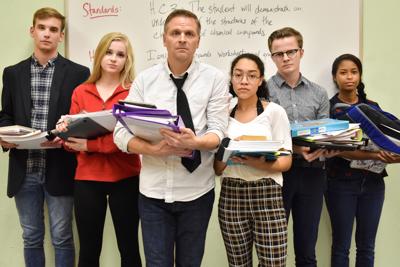
ReformED runs through Nov. 14 at Longstreet Theatre.
Just months ago, thousands of red-clad teachers from across the state skipped class and marched past the campus of the University of South Carolina on their way to a massive rally on the grounds of the Statehouse in an effort to rally support for reforms in public education. Now USC professor Peter Duffy is speaking up in another way — capturing the voices of teachers nationwide and dramatizing them in his new play ReformED.
“I was right there marching with them,” recalls the former high school educator and current head of USC’s graduate program in theater education. “I was incredibly proud of them.”
He saw the protesters as “fighting for their own chance to be [seen as] professionals,” in the same way that a doctor or a lawyer is perceived as a professional whose advice should be followed.
“They don’t feel like they are trusted.”
As a professional stage director who works with young actors, he realized that he had a unique medium with which to bring his research to life, devising a theatrical performance based on actual people’s stories.
He’s confident that public scholarship, where the general population can see and understand the results and conclusions of research and analysis, “is essential.”
“It does no one any good if it stays within the university or the academic journals.”
The work began four years ago, while leading a methods of teaching class.
“I had an ethical dilemma on preparing people for jobs that are so stressful and unpredictable — jobs where half of the people are leaving the profession,” he says.
He puzzled about how to “avoid being all puppies and rainbows” without scaring away his students from their chosen fields, but also being honest about what to expect in their careers?
“[Teachers] know they can be so creative, and so inspirational [to their students],” he posits, “but so many things get in the way.“
With the help of his graduate students, Duffy first surveyed more than 700 professional colleagues in all levels of public education across the U.S., and then interviewed 89 of them in person and via Skype.
Sheldon Paschal, who now teaches theater arts at River Bluff High School, was one of those graduate students, and describes the experience as “a very necessary exploration. What is pushing teachers away from education? How are their needs not being met? ... What is being done to create change? Having had even a small part in giving voice, shape and care to this piece and to the teachers who trusted us in hearing and telling their stories was very rewarding and eye-opening.”
Working from the interview transcripts, recurring themes were coded — funding, conflicts with administration, etc. Duffy then created composite characters who might embody and give voice to specific themes in a live performance.
“I wanted it to sound like a story,” he explains of his process, in which he wove together these first-hand accounts into a cohesive narrative. “There were more codes for crying than I was expecting.”
Duffy says that the play’s overall message of the story — spoken by 10 actors, most playing multiple roles, including both teachers and administrators — is that “we need to listen to teachers,” especially when it comes to how their time is allocated. Very few of his original survey respondents said that money — be it for more competitive salaries or enhanced classroom resources — was the only solution.
“It’s a much more complex web of complaints that teachers have,” Duffy says.
His hope is that he can “use their words to help untangle this web of issues, that causes teachers to find the experience demoralizing, frustrating and exhausting.”
The playwright clarifies, however, that “it’s not just a horror show of teachers versus administrators. There’s hope and possibilities and optimism. There are no clear heroes and no clear villains. You’ll see people make mistakes, both teachers and administrators. But then some are brilliant. It’s messy. There’s no clear answer on how we fix teaching — or how we fix learning.”
“For me,” he reflects, this new work “is my own sort of elegy for public education, which I’m strongly in favor of. The public school experience is profoundly American. Schools are now like our modern version of a town square. [A school] is the center of, ‘What does it mean to be a part of a community?’”
What: ReformED
Where: Longstreet Theatre, 1300 Greene St.
When: Through Nov. 14
Price: Free
More: theatre.sc.edu










